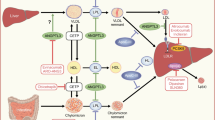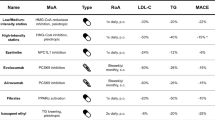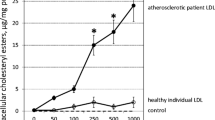We studied association of PCSK9 protein with the carotid artery intima-media thickness in patients with familial hypercholesterolemia (N=53; age 49.9±6.9 years) treated with statins. Blood level of PCSK9 protein was measured by ELISA; ultrasonography of the carotid arteries with measurement of the thickness of the intima-media complex of the common carotid arteries in the distal segment for 10 mm from the bifurcation on the far wall of the vessel was performed in on-line mode. The mean values were calculated for both sides, the maximum mean value was included in the analysis. It was shown that PCSK9 levels positively correlate with carotid artery intima-media thickness in patients with familial hypercholesterolemia.
Similar content being viewed by others
References
Cheng JM, Oemrawsingh RM, Garcia-Garcia HM, Boersma E, van Geuns RJ, Serruys PW, Kardys I, Akkerhuis KM. PCSK9 in relation to coronary plaque inflammation: Results of the ATHEROREMO-IVUS study. Atherosclerosis. 2016;248:117-122.
Gencer B, Montecucco F, Nanchen D, Carbone F, Klingenberg R, Vuilleumier N, Aghlmandi S, Heg D, Räber L, Auer R, Jüni P, Windecker S, Lüscher TF, Matter CM, Rodondi N, Mach F. Prognostic value of PCSK9 levels in patients with acute coronary syndromes. Eur. Heart J. 2016;37(6):546-553.
Kusters DM, Wiegman A, Kastelein JJ, Hutten BA. Carotid intima-media thickness in children with familial hypercholesterolemia. Circ. Res. 2014;114(2):307-310.
Lambert G, Petrides F, Chatelais M, Blom DJ, Choque B, Tabet F, Wong G, Rye KA, Hooper AJ, Burnett JR, Barter PJ, Marais AD. Elevated plasma PCSK9 level is equally detrimental for patients with nonfamilial hypercholesterolemia and heterozygous familial hypercholesterolemia, irrespective of low-density lipoprotein receptor defects. J. Am. Coll. Cardiol. 2014;63(22):2365-2373.
Leander K, Mälarstig A, Van’t Hooft FM, Hyde C, Hellénius ML, Troutt JS, Konrad RJ, Öhrvik J, Hamsten A, de Faire U. Circulating proprotein convertase subtilisin/kexin type 9 (PCSK9) predicts future risk of cardiovascular events independently of established risk factors. Circulation. 2016;133(13):1230-1239.
Lim GB. Low prognostic utility of measuring PCSK9 levels in ACS. Nat. Rev. Cardiol. 2016;13(2):62-63.
Nordestgaard BG, Chapman MJ, Humphries SE, Ginsberg HN, Masana L, Descamps OS, Wiklund O, Hegele RA, Raal FJ, Defesche JC, Wiegman A, Santos RD, Watts GF, Parhofer KG, Hovingh GK, Kovanen PT, Boileau C, Averna M, Borén J, Bruckert E, Catapano AL, Kuivenhoven JA, Pajukanta P, Ray K, Stalenhoef AF, Stroes E, Taskinen MR, Tybjærg-Hansen A; European Atherosclerosis Society Consensus Panel. Familial hypercholesterolaemia is underdiagnosed and undertreated in the general population: guidance for clinicians to prevent coronary heart disease: Consensus Statement of the European Atherosclerosis Society. Eur. Heart J. 2013;34(45):3478-3490a.
Raal F, Panz V, Immelman A, Pilcher G. Elevated PCSK9 levels in untreated patients with heterozygous or homozygous familial hypercholesterolemia and the response to high-dose statin therapy. J. Am. Heart Assoc. 2013;2(2):e000028.
Rogacev KS, Heine GH, Silbernagel G, Kleber ME, Seiler S, Emrich I, Lennartz S, Werner C, Zawada AM, Fliser D, M, März W, Scharnagl H, Laufs U. PCSK9 plasma concentrations are independent of GFR and do not predict cardiovascular events in patients with decreased GFR. PLoS One. 2016;11(1):e0146920.
Shan L, Pang L, Zhang R, Murgolo NJ, Lan H, Hedrick JA. PCSK9 binds to multiple receptors and can be functionally inhibited by an EGF-A peptide. Biochem. Biophys. Res. Commun. 2008;375(1):69-73.
Tibolla G, Dhyani A, Baragetti A, Catapano AL. Plasma proprotein convertase subtilisin kexin type 9 (PCSK9) and plasma lipids in a free living population: results from the plic study. Atherosclerosis. 2014;235(2):e60. doi: 10.1016/j.atherosclerosis.2014.05.149.
Werner C, Hoffmann MM, Winkler K, Böhm M, Laufs U. Risk prediction with proprotein convertase subtilisin/kexin type 9 (PCSK9) in patients with stable coronary disease on statin treatment. Vascul. Pharmacol. 2014;62(2):94-102.
Xie W, Liu J, Wang W, Wang M, Qi Y, Zhao F, Sun J, Liu J, Li Y, Zhao D. Association between plasma PCSK9 levels and 10-year progression of carotid atherosclerosis beyond LDLCh: a cohort study. Int. J. Cardiol. 2016;215):293-298.
Zhu YM, Anderson TJ, Sikdar K, Fung M, McQueen MJ, Lonn EM, Verma S. Association of proprotein convertase subtilisin/ kexin type 9 (PCSK9) with cardiovascular risk in primary prevention. Arterioscler. Thromb. Vasc. Biol. 2015;35(10):2254-2259.
Author information
Authors and Affiliations
Corresponding author
Additional information
Translated from Byulleten’ Eksperimental’noi Biologii i Meditsiny, Vol. 163, No. 2, pp. 160-163, February, 2017
Rights and permissions
About this article
Cite this article
Benimetskaya, K.S., Ragino, Y.I., Shakhtshneider, E.V. et al. Association of Level of Proprotein Convertase Subtilisin/Kexin Type 9 with Intima-Media Thickness in Patients with Familial Hypercholesterolemia. Bull Exp Biol Med 163, 199–202 (2017). https://doi.org/10.1007/s10517-017-3765-3
Received:
Published:
Issue Date:
DOI: https://doi.org/10.1007/s10517-017-3765-3




